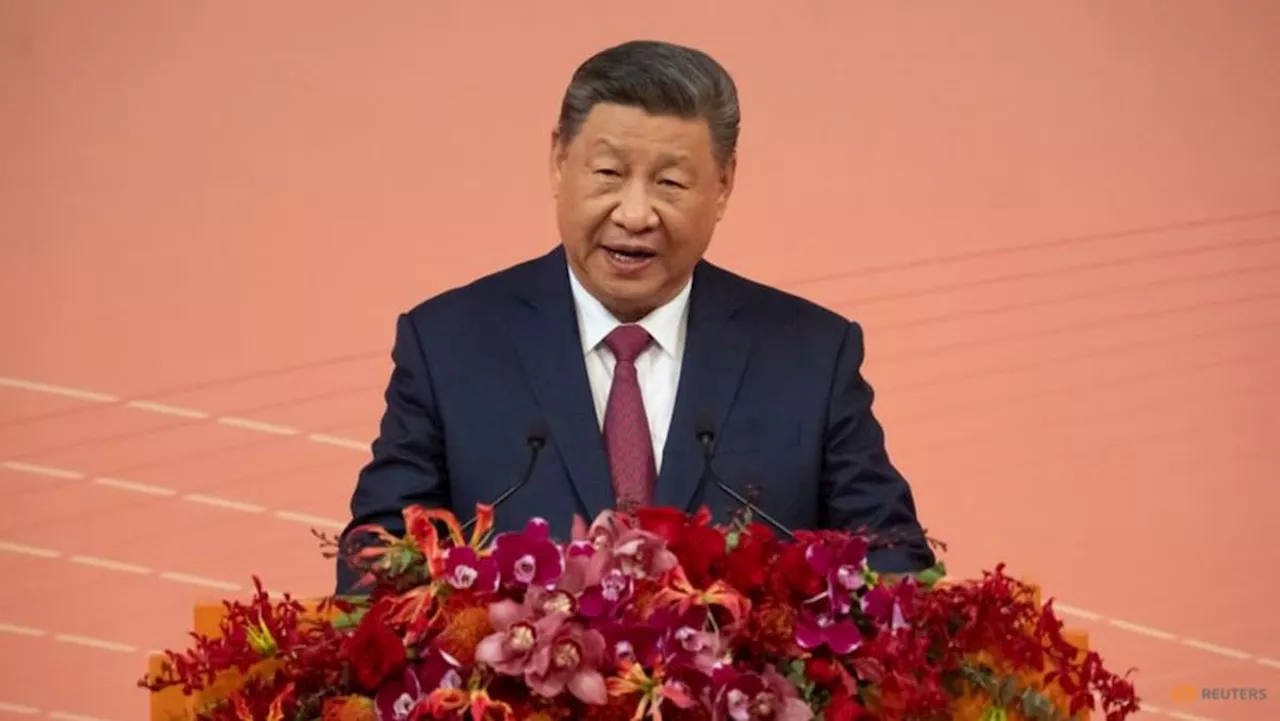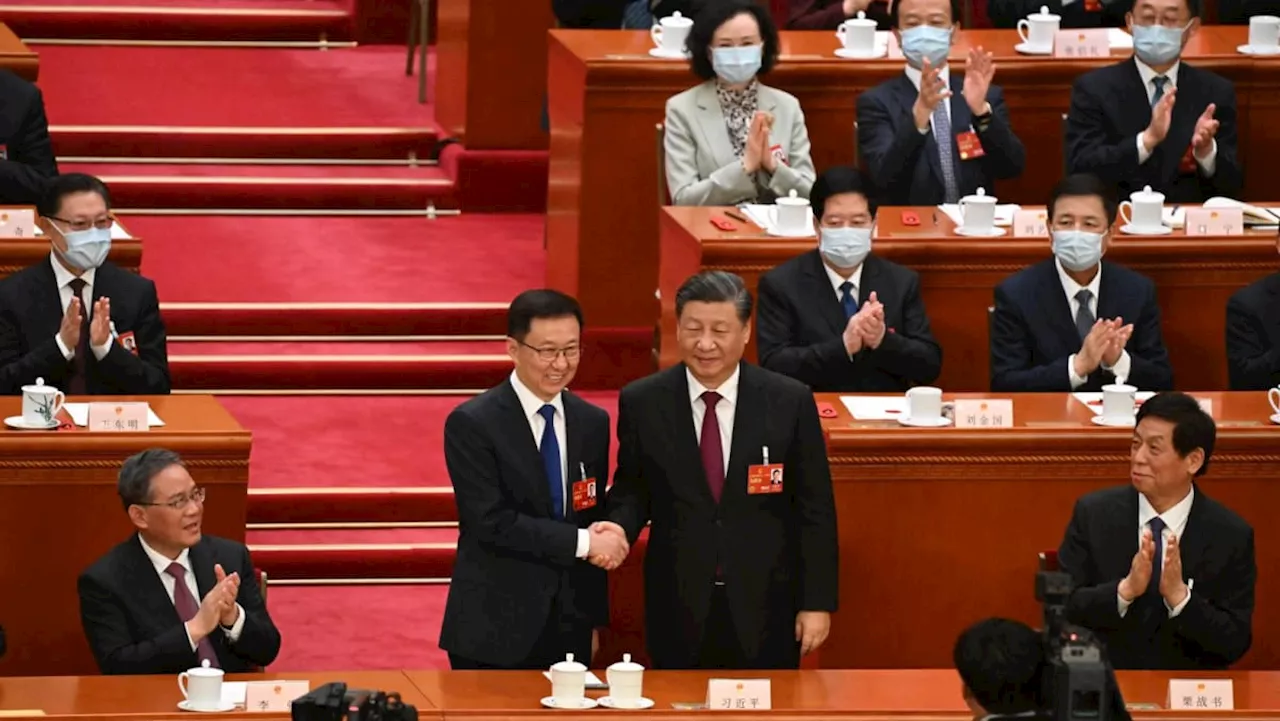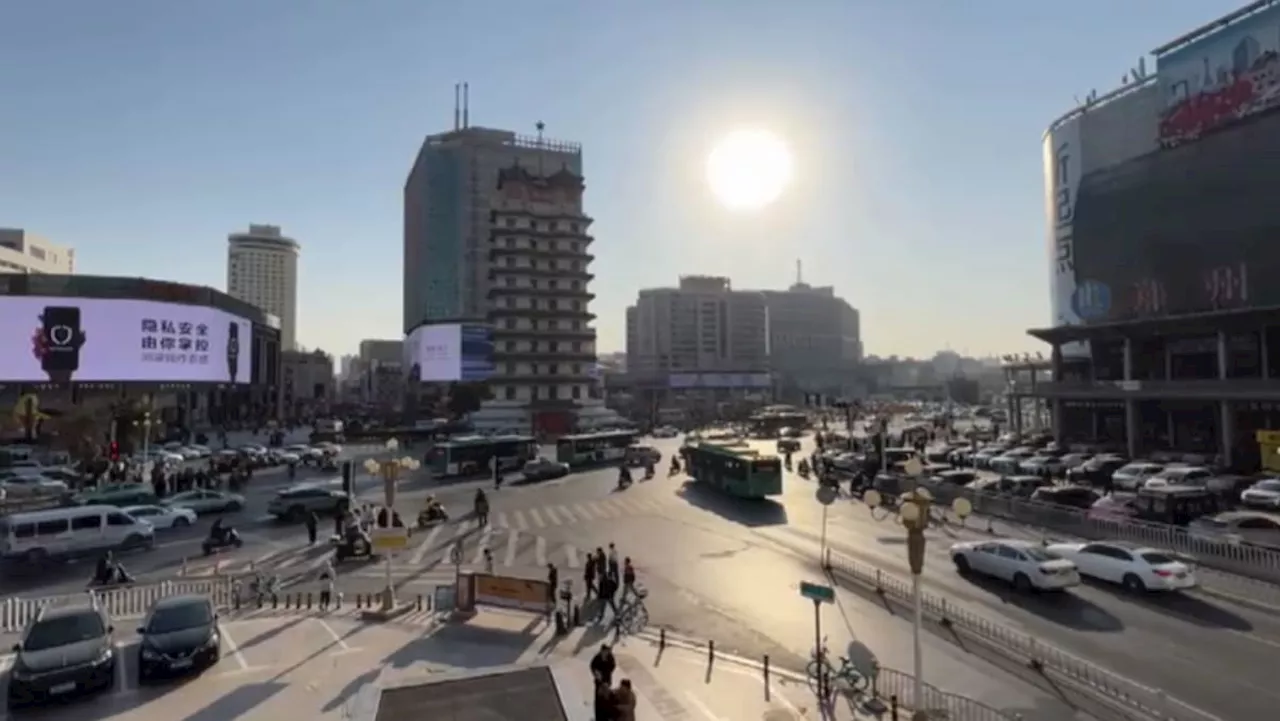US politics expert Steven R Okun warns that even if the US and China reach a deal on tariffs, the adversarial relationship will worsen. He cites China's non-compliance with WTO commitments, its industrial policies aimed at dominating key sectors, and its alleged actions like forced technology transfers and cyber theft as justifications for US tariffs. While President Trump initially appeared conciliatory towards China, analysts believe the trade war is likely to continue, with both sides engaging in tit-for-tat measures. Okun suggests that China may test the limits of US concessions or escalate the conflict further, while the US aims to pressure China into changing its economic practices.
Even if the United States and China reach a deal on tariffs, the adversarial relationship will worsen, says US politics expert Steven R Okun.
Though US President Donald Trump, sworn in for a second term last month, appeared to strike a conciliatory tone on China, telling global leaders at the World Economic Forum that he looked forward to “getting along” with Beijing, the unexpected positive tone - especially after his campaign threats to impose tariffs as high as 60 percent on China - has led some experts on both sides of the Pacific to forecast a grand bargain coming between the United States and China. However, the current climate suggests otherwise. The US is set to impose tariffs on a range of Chinese goods, including $2.4 billion worth of consumer goods, like smartphones and laptops, along with 10 percent duties on crude oil, farm equipment, large-displacement vehicles and pickup trucks, in addition to a targeted investigation of Google. These tariffs, among other measures, are to take effect on February 10. Even if these tariffs get paused, as did the ones between the US with Canada and Mexico, that will not be indicative of an easing of this trade war.For the US, the origin of this trade war traces back to China not living up to its World Trade Organization (WTO) commitments after joining in 2001, and certainly at least 10 years ago when Beijing rolled out its Made in China 2025 blueprint, an ambitious industrial policy aimed at dominating key sectors of the 21st century achieved through state subsidies and an uneven playing field for foreign businesses. Add on the forced technology transfers, cyber theft and China’s failure to live up to its trade commitments, and the US finds ample justification for the tariffs implemented by both the Trump and Biden administrations, and the new ones in Trump 2.0. From Washington’s perspective, China isn’t looking to avoid a trade war - it simply wants to escape retaliation for the one it started. There are a few days before China’s retaliatory tariffs are set to kick in, and reports suggest China is preparing an initial proposal for trade negotiations. According to the Wall Street Journal, the proposal involves reviving the “Phase 1” deal that Mr Trump signed with Chinese President Xi Jinping in 2020. The two leaders are expected to meet at the G20 summit in November. However, for a true resolution to occur from Washington’s perspective, China must go past just buying more stuff from the US and move off its current path. Sure, China doesn’t want tariffs from the US, but it’s hard to see any substantive behaviour China will change to keep the US from its course of retaliation beyond tariffs, such as investment restrictions and export restrictions targeting China’s ability to make advanced semiconductors. Analysts point to China having another 10 percent levied against it while Canada and Mexico each had 25 percent as evidence that Mr Trump is serious about taking a hard line against Beijing. Michael Cunningham of the Asian Studies Center at the Heritage Foundation told me that Mr Trump will likely have to act against Beijing multiple times during his presidency. “I wouldn’t say Trump went easy on China by just having 10 percent tariffs. He worked out deals with Canada and Mexico to pause their tariffs, but the tariffs on China went ahead as planned, and he has said multiple times that additional tariffs are forthcoming,” Cunningham said. “Doing so sends a message that he’s serious, which gives him negotiating leverage, without getting too far ahead of his team’s ongoing review of US-China trade that presumably will help inform future tariff plans,” Cunningham added. “Trump has made clear he is prepared to make a deal with Xi, with whom he believes he has a special relationship, although the tit-for-tat may go several rounds,” she told me. “Ultimately, whether we will see a prolonged US-China tariff war may depend more on whether China is interested in playing Trump’s game. China could choose to test how little it can offer to buy Trump off or, instead, up the ante exerting its own leverage on the US.”Just weeks into his presidency, forecasting Mr Trump’s next moves is futile. Only days ago, speculation was rampant about the trajectory of the North American trade war. Then Mr Trump agreed to pause tariffs on Canada and Mexico for 30 days, after reaching last-minute deals with its neighbours on border enforcement. Regarding that, Mike McCurry, White House Press Secretary under President Clinton, told me: “I think this was all a bluff. Canada and Mexico basically did what they were already doing but saw it in their interest to let Trump take a victory lap. Dealing with the Chinese will be trickier.
US-China Trade War Tariffs Donald Trump Xi Jinping WTO Made In China 2025 Global Economics
Singapore Latest News, Singapore Headlines
Similar News:You can also read news stories similar to this one that we have collected from other news sources.
 Trump says he and China's Xi have been talking through aidesWASHINGTON: US President-elect Donald Trump said on Monday (Jan 6) that he and Chinese leader Xi Jinping have been speaking through representatives and he believes the two leaders will get along.
Trump says he and China's Xi have been talking through aidesWASHINGTON: US President-elect Donald Trump said on Monday (Jan 6) that he and Chinese leader Xi Jinping have been speaking through representatives and he believes the two leaders will get along.
Read more »
 China Sends Vice President to Trump's Inauguration in Precedent-Breaking MoveChina's Vice President Han Zheng will attend Donald Trump's inauguration on January 20, marking the first time a senior Chinese official has done so. Analysts say Han Zheng's appointment is a 'safe choice', balancing diplomatic courtesy without exposing President Xi Jinping to potential embarrassment amid Trump's unpredictable nature. This move breaks protocol as heads of state rarely attend US presidential inaugurations.
China Sends Vice President to Trump's Inauguration in Precedent-Breaking MoveChina's Vice President Han Zheng will attend Donald Trump's inauguration on January 20, marking the first time a senior Chinese official has done so. Analysts say Han Zheng's appointment is a 'safe choice', balancing diplomatic courtesy without exposing President Xi Jinping to potential embarrassment amid Trump's unpredictable nature. This move breaks protocol as heads of state rarely attend US presidential inaugurations.
Read more »
 Hope and Apprehension: Trump's Return Sparks Uncertainty in US-China RelationsAs Donald Trump returns to the White House, Chinese officials and businesses express a mixture of hope and apprehension about the future of US-China relations.
Hope and Apprehension: Trump's Return Sparks Uncertainty in US-China RelationsAs Donald Trump returns to the White House, Chinese officials and businesses express a mixture of hope and apprehension about the future of US-China relations.
Read more »
 China’s ‘iPhone city’ Zhengzhou braces for uncertainty as Trump returns to officeZhengzhou, a major manufacturing hub that makes many of the world’s Apple iPhones, bore the brunt of the trade war between the US and China during Donald Trump's first term.
China’s ‘iPhone city’ Zhengzhou braces for uncertainty as Trump returns to officeZhengzhou, a major manufacturing hub that makes many of the world’s Apple iPhones, bore the brunt of the trade war between the US and China during Donald Trump's first term.
Read more »
 Trump's Return to White House Brings China Breathing RoomUS President Donald Trump's first day back at the White House was met with mixed reactions from world leaders, with trade and tariffs being a key concern. However, the day ended with China receiving some unexpected relief as Trump avoided committing to a specific plan for Chinese tariffs and promised meetings with Chinese President Xi Jinping.
Trump's Return to White House Brings China Breathing RoomUS President Donald Trump's first day back at the White House was met with mixed reactions from world leaders, with trade and tariffs being a key concern. However, the day ended with China receiving some unexpected relief as Trump avoided committing to a specific plan for Chinese tariffs and promised meetings with Chinese President Xi Jinping.
Read more »
 China's Ties With Japan, India, and Others Improve as Trump Returns to White HouseChina is experiencing a boost in relations with countries like Japan, India, and the UK, coinciding with Donald Trump's return to the presidency. This shift presents an opportunity for China to capitalize on potential divisions within traditional US alliances.
China's Ties With Japan, India, and Others Improve as Trump Returns to White HouseChina is experiencing a boost in relations with countries like Japan, India, and the UK, coinciding with Donald Trump's return to the presidency. This shift presents an opportunity for China to capitalize on potential divisions within traditional US alliances.
Read more »
